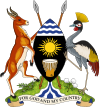Related Research Articles

A part of Eastern Africa, the territory of what is known as Kenya has seen human habitation since the beginning of the Lower Paleolithic. The Bantu expansion from a West African centre of dispersal reached the area by the 1st millennium AD. With the borders of the modern state at the crossroads of the Bantu, Nilo-Saharan and Afro-Asiatic ethno-linguistic areas of Africa, Kenya is a multi-ethnic state. The Wanga Kingdom was formally established in the late 17th century. The Kingdom covered from the Jinja in Uganda to Naivasha in the East of Kenya. This is the first time the Wanga people and Luhya tribe were united and led by a centralized leader, a king, known as the Nabongo.
The history of Uganda comprises the history of the people who inhabited the territory of present-day Uganda before the establishment of the Republic of Uganda, and the history of that country once it was established. Evidence from the Paleolithic era shows humans have inhabited Uganda for at least 50,000 years. The forests of Uganda were gradually cleared for agriculture by people who probably spoke Central Sudanic languages.......

Idi Amin Dada Oumee was a Ugandan military officer and politician who served as the third president of Uganda from 1971 to 1979. He ruled as a military dictator and is considered one of the most brutal despots in modern world history.

Apollo Milton Obote was a Ugandan politician who served as the second prime minister of Uganda from 1962 to 1966 and the second president of Uganda from 1966 to 1971 and later from 1980 to 1985.

The Protectorate of Uganda was a protectorate of the British Empire from 1894 to 1962. In 1893 the Imperial British East Africa Company transferred its administration rights of territory consisting mainly of the Kingdom of Buganda to the British government.

The history of Uganda from 1963 through 1971 comprises the history of Uganda from Ugandan independence from the United Kingdom to the rise of the dictator Idi Amin.

The Second Republic of Uganda existed from 1971 to 1979, when Uganda was ruled by Idi Amin's military dictatorship.

Thomas Joseph Odhiambo Mboya was a Kenyan trade unionist, educator, Pan-Africanist, author, independence activist, and statesman. He was one of the founding fathers of the Republic of Kenya. He led the negotiations for independence at the Lancaster House Conferences and was instrumental in the formation of Kenya's independence party – the Kenya African National Union (KANU) – where he served as its first Secretary-General. He laid the foundation for Kenya's capitalist and mixed economy policies at the height of the Cold War and set up several of the country's key labour institutions. Mboya was Minister for Economic Planning and Development when he was assassinated.
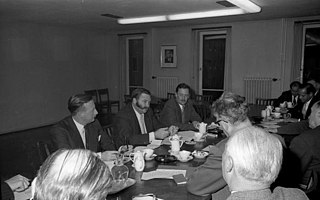
Bruce Roy McKenzie EGH was a South African-born Kenyan politician. He was the Minister of Agriculture in Kenya during the presidency of Jomo Kenyatta, to whom he was an adviser. He is alleged to have been an agent for British, South African or Israeli intelligence. He was assassinated on the orders of Ugandan dictator Idi Amin.

Hinduism in Uganda arrived when the colonial British Empire brought Hindus along with other Indian workers to its East African colonies in late 19th and early 20th centuries. The largest arrival of Hindu immigrants to Uganda, some educated and skilled but mostly poor and struggling from the famine-prone areas of Punjab and Gujarat, was to help construct the Kenya-Uganda Railway connecting landlocked parts of Uganda and Kenya with the port city of Mombasa. The largest departure of Hindus from Uganda occurred when General Idi Amin expelled them and seized their properties in 1972.
In early August 1972, the President of Uganda Idi Amin ordered the expulsion of his country's Indian minority, giving them 90 days to leave the country. At the time, South Asians in East Africa were simply known as "Asians". They had come to dominate trade under British colonial policies.
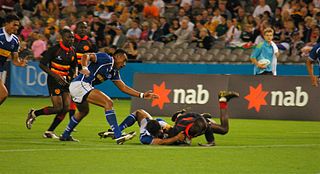
Rugby union in Uganda has been played since colonial times when it was introduced by the British. The governing body is the Uganda Rugby Football Union.
The military history of Uganda begins with actions before the conquest of the country by the British Empire. After the British conquered the country, there were various actions, including in 1887, and independence was granted in 1962. After independence, Uganda was plagued with a series of conflicts, most rooted in the problems caused by colonialism. Like many African nations, Uganda endured a series of civil wars and coup d'états. Since the 2000s in particular, the Uganda People's Defence Force has been active in peacekeeping operations for the African Union and the United Nations.
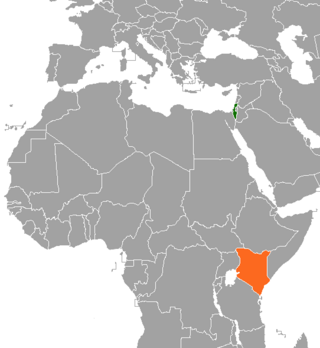
Israel–Kenya relations are foreign relations between Israel and Kenya. The countries established diplomatic relations in December 1963. Israel has an embassy in Nairobi. Kenya has an embassy in Tel Aviv.

India–Uganda relations are bilateral relations between the Republic of India and the Republic of Uganda. India and Uganda established diplomatic relations in 1965 and each maintain a High Commission in the other's capital. The Indian High Commission in Kampala has concurrent accreditation to Burundi. Uganda hosts a large Indian community and India–Uganda relations cover a broad range of sectors including political, economic, commercial, cultural and scientific cooperation.
Kung'u Karumba was a Kenyan nationalist and freedom-fighter. He was a member of the Kapenguria Six, along with Bildad Kaggia, Jomo Kenyatta, Fred Kubai, Paul Ngei, and Ochieng Oneko.
Cuthbert Joseph Obwangor was a longtime Ugandan minister and legislator. He was a minister and a political prisoner for the Apollo Milton Obote regime after he opposed Obote's extension of power while Obwangor was a minister.
The Uganda Army, also known as the Uganda Rifles, served as the national armed forces of Uganda during the presidencies of Mutesa II and Milton Obote. As time went on, the military was gradually expanded and increasingly interfered in Uganda's national politics. It played a prominent role in defeating local insurgencies, suppressing opposition to Obote, and intervened in conflicts in the Congo as well as Sudan. Dissatisfied soldiers overthrew Obote in 1971, resulting in the establishment of the Second Republic of Uganda under the dictatorship of army commander Idi Amin. The Uganda Army was purged, with thousands of suspected pro-Obote troops killed or fleeing the country. The military was consequently split into an army serving under Amin – the Uganda Army (1971–1980) – and exiled rebel factions. The latter helped to overthrow Amin's regime during the Uganda–Tanzania War of 1978–79, and became the core of the Uganda National Liberation Army which would serve as Uganda's national military from 1980 to 1986.
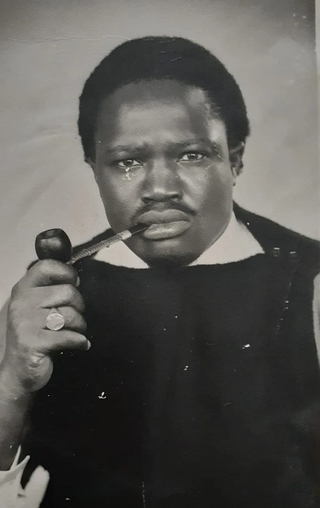
Ochola Ogaye Mak'Anyengo, also known as George Philip Ochola (1930–1990) was a Kenyan trade unionist and Member of Parliament for Ndhiwa, South Nyanza, Kenya. He was involved in the fight for Kenya's independence and was a beneficiary of the Mboya-Kennedy airlifts.
The Luo Union was a welfare organisation formed in Nairobi, Kenya, in the early 1920s. This organisation sought to create, expand and govern a general cultural identity among Luo people in East Africa. Luo people are a Nilotic ethnic group native to western Kenya and the Mara Region of northern Tanzania in East Africa. The Luo Union was one of several welfare organisations started during the colonial period in East Africa which aimed at building broad cultural unity. This organisation played a crucial role in creating a collective sense of identity and unity amongst Luo people after the Second World War. It was also an important medium of grassroots political support for African Nationalist movements in the 1950s. The Luo Union FC was the unions soccer club. This club would later become Gor Mahia FC, one of Kenya's best performing football clubs.
References
- 1 2 3 4 Uganda: Labour Market Profile 2019 (PDF). Copenhagen: Danish Trade Union Council for International Development and Cooperation. Retrieved 18 October 2019.
- ↑ Orr, Charles A. (1966). "Trade Unionism in Colonial Africa". The Journal of Modern African Studies. 4 (1): 65–81. doi:10.1017/S0022278X00012970. ISSN 0022-278X. JSTOR 159416.
- ↑ Goodman, Stephen H. (1969). "Trade Unions and Political Parties: The Case of East Africa". Economic Development and Cultural Change. 17 (3): 338–345. doi:10.1086/450362. ISSN 0013-0079. JSTOR 1152182.
- ↑ Mutibwa, Phares Mukasa. (1992). Uganda since independence : a story of unfulfilled hopes. Trenton, N.J.: Africa World Press. ISBN 0865433569. OCLC 28216159.
- ↑ "External evaluation of LO-Norway's cooperation with National Organisation of Trade Unions, (NOTU), Uganda". NoradDev (in Norwegian). Retrieved 2019-10-23.
- ↑ "Labour-centred development and decent work : a structuralist perspective on informal employment and trade union organizing in Uganda". Saint Mary's University. Retrieved 2023-08-27.
